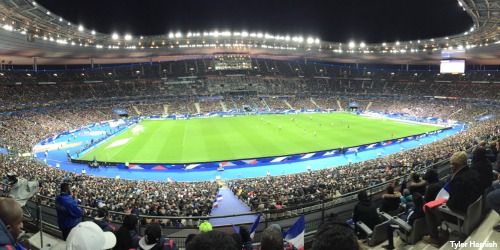The business meeting was wrapping up, and Tyler Harnish wanted to take his co-workers out for dinner in Paris. But two of co-workers, flown in from San Francisco, had a different idea: They wanted to experience a soccer match overseas.
Harnish, 41, is an avid soccer fan. He plays every week, has traveled to two World Cups and is a season-ticket holder for Arsenal. He told his co-workers the club season wasn't playing at the moment, but France's national team was hosting Germany later that evening in Paris.
Harnish, a London-based vice president for prominent tech-firm, was happy to lead the two others to Stade de Paris. That's the first of many what-ifs Harnish has been trying to push out of his mind. What if they hadn't gone to the soccer game that night?
"I was talking to a friend who I was telling this story to, and this friend's marketing agency -- they lost nine people," Harnish says. "Nine people from this guy's company are dead. Those are the what-ifs you can't go through."
It's a fruitless exercise, playing out hypotheticals grounded in the past. But less than a week after terrorists killed 129 people in a coordinated attack in Paris, those questions won't lay quiet in his mind.
What if he had arrived just a few minutes later?
Harnish and his group still went to dinner at East Mamma before the game. They arrived at the stadium after the match had started -- about 10 minutes late, Harnish says. Exiting their Uber, they ran into Stade de France through a side entrance, passing through security that frisked the party as it arrived.
Harnish was later told he had used the same entrance that, five minutes later, would be tried by an attacker wearing a bomb vest. Stadium security found the jacket underneath his clothes; the bomber stepped back and blew himself up.
Harnish and his friends were in their seats by that time, and the explosion startled everyone. His friends, new to soccer, looked to him for an explanation. Harnish didn't have one.
"I was actually very surprised," Harnish says. "I've seen flares, I've heard fireworks in stands, but I've never heard anything like that."
The explosion was particularly jolting because it occurred right beneath their seats. Harnish estimates they were seated maybe 40 yards above the explosion, and sitting in a section that was filled with children between 8 and 16 years old.
He ordered a beer from a vendor and asked the man if he knew what the loud noise was. The vendor couldn't say. He paid for the beer and they went their separate ways.
Now, Harnish wonders what would have happened had they been running behind by just a few more minutes. Instead of being 10 minutes late, what if they'd arrived 15 minutes after the game's kickoff, reaching the side entrance at the same time as the first bomber.
What if the French president wasn't in attendance?
Three minutes after the first suicide bomber, another attacker arrived on the opposite side of the stadium. By then, security personnel were already evacuating French President François Hollande, who had been watching the game. The action occurred so quickly that, according to The Wall Street Journal, many other members of the stadium's security team were unaware of the initial bombing until they were notified that the president had left his VIP box.
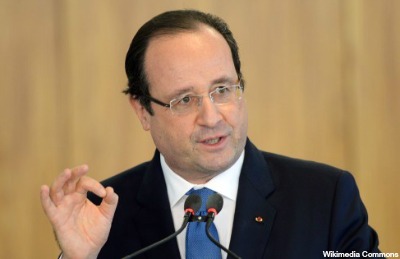
The second bomber also failed to gain entry into the stadium, detonating his bomb vest outside. Harnish says that blast was audible from his seat, but it was far less powerful. A suspected third stadium bomber never even arrived, instead detonating his vest at a McDonald's near the stadium, still within hearing distance.
In total, one civilian was killed in those three attempted bombings -- far less than the terrorist's intended carnage, which would have killed civilians in two separate waves: First, through coordinated bombings through the stadium, and then in a deadly stampede of terrified fans attempting to flee.
"What I think -- and thank God -- I think there was an extra level of security because the president of France was in attendance," Harnish says. "Had the stadium not had that layer of security, those three bombers would have gotten into the stadium. There's no question in my mind."
Instead, fans around the stadium stayed and watched the soccer game, largely unaware of what was happening outside in the streets of Paris. Then, somewhere between the 70th and 80th minute, Harnish's phone lit up.
What if his group had stayed inside the stadium?
"My phone rang. It was a mate of mine in London," Harnish says. "He asked where I was, and he said, 'There's bombs going off. It's all over Paris. You need to be safe.' I looked at the guys and said, 'Let's go, let's get out of here.'
"I question whether that was the right move."
Inside the stadium, fans had remained relatively normal. Security had reportedly informed the French and German coaches of the attacks on the stadium, but that information was kept from spectators and even the players. The goal was to maintain a sense of calm in the stadium, which by that point was crawling with police with SWAT teams on the outside.
In that sense, Stade de France was one of the safest places in Paris. But Harnish and his group didn't know that. They only knew the city was under attack.
Outside, they met an entirely different environment, one ruled by terror and chaos. One of the member of Harnish's group took video of police corralling citizens on the streets:
"Instantly, we had flashlights on us, being told in French to raise our hands, officers pointing guns at us," Harnish says. "And I just kept saying, 'I don't want to be in a crowd, I want to get away.' So we kind of peeled off from there.
"We got onto the street, and the group kind of fanned out. I looked up to see a wall of people sprinting at me, screaming. And I said, 'Oh God, there's a gunman. So we turned and I told the guys, 'Go, go, go!' and we ran off."
Harnish and his group eventually ran themselves into a dead end. They stopped and Harnish encouraged the group to stay calm and think. They stood by some cars that could provide cover if gunfire broke loose. The trio watched the crowd run by.
"I saw people running and screaming, but I didn't hear anything," Harnish says. "I said, let's just go back the way people were running. … There were six or eight swat team members peering around the corner, and it looked like they were surveilling something."
Harnish's group was able to avoid the congestion of a large crowds -- and the risk of being in a tightly-packed space targeted by terrorists -- by slowing down, using their senses and taking a different course.
"What I think happened was, people expected something," Harnish says. "You expect bullets coming through you."
Even away from the crowd, that expectation hung thick in the air.
What if there was someone hiding around the corner?
The Paris streets were full of confusion: Roads blocked off, police funneling pedestrians away from certain areas and down alternate route. Harnish and his group accidentally circled back to the stadium. Their phones weren't able to make or receive calls. They didn't want to get on the train, thinking it was too likely a target.
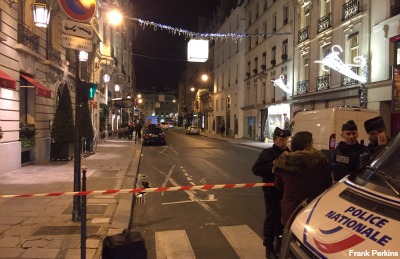
Eventually, the group found some stairs that led to a thoroughfare, and they took that path for a couple of miles. Harnish says they eventually connected with his company's head of security, who ran them through a safety protocol and helped them get to where they were going.
The streets were quiet, but far from secure. Every corner brought a renewed sense of fear and anxiety. The city had been thrust into chaos, and any moving shadow presented a possible threat.
"We're peering around corners because you don't know what's there," Harnish says. "You keep expecting to run across someone with guns."
They finally found a train platform that was mostly vacant, with a semi-full train car. They got on board and took it to the center of the city, close to the group member's hotels.
"Now we're in between all these areas that were hit by the gunmen," Harnish says. "The streets were deserted. There were some taxis but not many. It was just SWAT police.
"We went down a street and a police officer would point his gun at us, not aggressively, but … every scooter that goes by, every car, you're looking over your shoulder because you know these guys are somewhere, and the police had said, 'This is not over.'"
Finally, the group arrived at the hotel where one of them was staying, and a nearby bar was open. They decided to stop, sit down, talk things through and contact their families. They seemed to be through the worst of it, and yet there was a reluctance to drink too much, to lose their senses. Harnish's hotel was still another two kilometers away, and no one could be certain another attack wasn't on the way.
"That's the definition of terror," Harnish says. "You're afraid of something, but you don't know what."
What if they hadn't had their phones?
Amid all of the chaos, one constant provided much-needed stability for Harnish and his crew: The apps on their smartphones. Even with phone calls out of the equation, the group used their phone-based resources to communicate with the outside world, navigate the winding streets of Paris, and document some of the action they confronted.
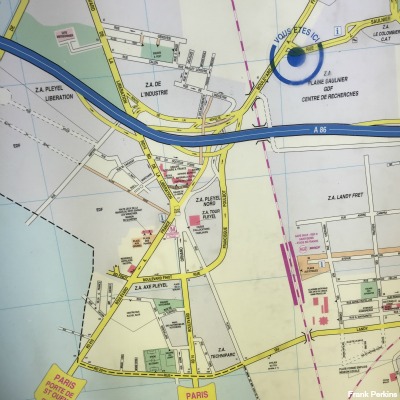
With chaos all around, the group knew they needed a plan.
"Your plan is that blue dot [in Google Maps], you know?" Harnish says. "And you have a plan. That was kind of, somewhat calming."
Harnish never wound up trekking those two kilometers to his hotel on foot. In the bar, he found someone with a car who drove him home. He finally went to sleep at about 5 in the morning, and woke up around 8.
Outside, Paris was quiet. Harnish tweeted Eurostar to see if train lines were running between Paris and London, where he lives. He took a slow cab ride through streets empty of people, but full of police and security personnel. As he passed the Eiffel Tower, such a popular destination for tourists and Parisians alike, was host to only one group: Military commandos wielding automatic rifles.
Harnish arrived at the train station, boarded without trouble and arrived home later that day.
What if his girlfriend had been with him?
Harnish emphasizes the value of staying calm amid the madness of Paris' streets. He's traveled widely in third-world countries, encountering situations where guns are far more commonplace, and danger lurks much closer to the surface. Those experiences, he thinks, helped him handle a terrifying situation on his home turf with poise.
One of his companions that night, Frank Perkins, lives in San Francisco, but he had been in New York City on 9/11, and lived through a similar act of terror.
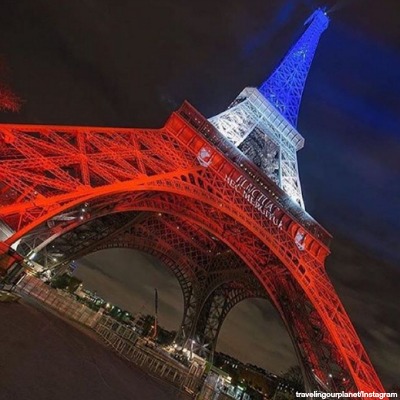
"I don't want to speak for Frank, but when you go through chaos before, there's some form of -- sickly enough -- there's some form of familiarity to it," Harnish says.
It's becoming a new skill set in our modern-day world: Experience reacting to terrorist attacks.
Harnish can see how, in different circumstances, he might not have been so successful at regulating himself.
"I'm just thankful that my girlfriend wasn't with me," he says. "Sometimes, if she's in town for work, she'll come out with me. ... Managing her fear would have been really, really tough. Would have added an element of difficulty."
Harnish is still processing the scene outside the stadium, where both civilians and police were stripped down to their most desperate states. In a developed, modern city like Paris, such threats often feel far away. Even inside a stadium surrounded by mayhem, Harnish was at a total remove.
"It was absolute chaos outside of the stadium," Harnish says. "Inside the stadium was fine. I think you can dissociate, if you don't see the guns, the police, all that stuff ... we're numb to these things because of the news.
"There's war every day, and so much violence, and as you're going through that, you're just seeing the news flashes on the phone, you're just watching a newscast. You can dissociate [from what's going on outside]."
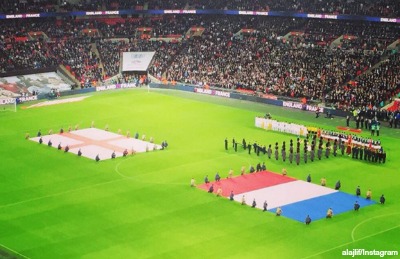
Back in London, Harnish returned to his regular routine. England hosted France on Tuesday in a soccer match -- one that also served as a memorial and a show of international support. Wembley Stadium was lit in the colors of the French flag, and the English crowd sang the France's national song, "La Marseillaise," before the match.
Harnish didn't go -- he was playing soccer that night -- but he was moved by the tribute. After the central role soccer played in an attempt to terrorize Paris -- and through that city, the rest of the world -- he's hopeful that sport can play a role in rebuilding spirits, healing hearts, and bringing the world's nations together.
"You go to watch football, and that sort of thing happens," Harnish says. "Sports is a relief -- it's a place where you go watch the best of the best perform, and when you're thinking about safety and there's these cowardly acts, it gives you pause. What have we done wrong?
"But I think, as I look across the world and see countries lighting up their national monuments, in a way, that helps you heal. You hope that there's some sort of unification, that we can rise up above these violent attacks."
-- Follow Jonathan Crowl on Twitter @jonathancrowl.


